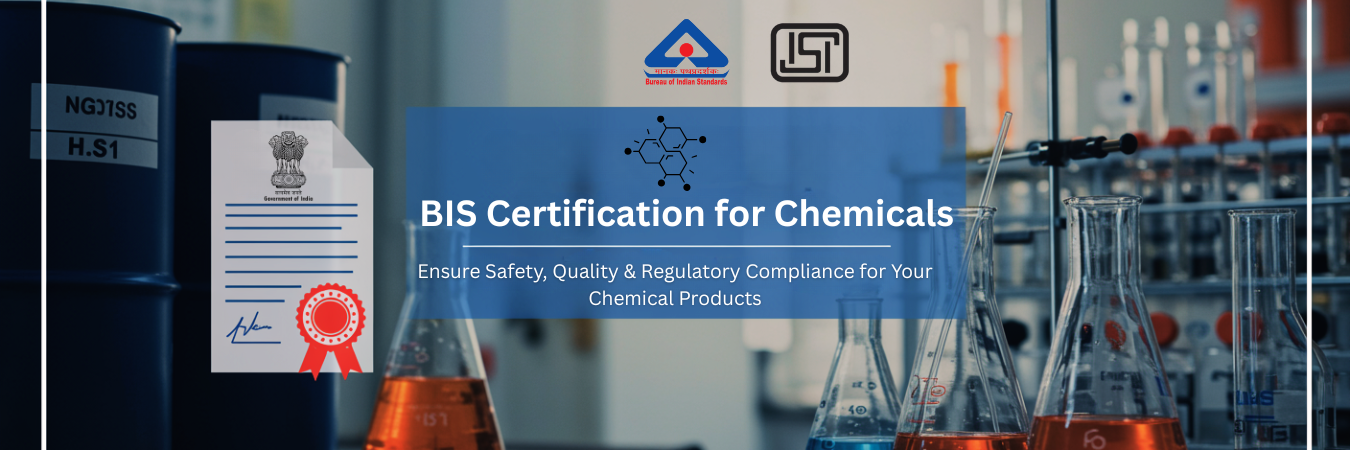

KMA Global Complete Guide to Getting BIS Certification for Chemicals in India
INTRODUCTION
In today's regulatory environment, making sure that products are of high quality and meet all requirements is not just a formality; it's a strategic need. The Bureau of Indian Standards (BIS) certification makes this duty even stronger in the chemical industry.
The ISI mark, which is also known as BIS certification, shows that something is safe, trustworthy, and of good quality. It's not just about building brand trust for producers and importers; Indian law says that many chemical products must have it.
As companies go through the BIS certification process, we at KMA Global help them confidently deal with technical rules, paperwork, and deadlines for compliance.
Why BIS Certification is very important in the chemical industry
Many fields, such as textiles, food processing, pharmaceuticals, agriculture, and manufacturing, rely on chemicals. India has strict rules about chemicals because they are used a lot and can be dangerous.
BIS certification guarantees:
BIS certification is helpful whether you make or import:
Regulatory Structure: Quality Control Orders (QCOs) + BIS
BIS certification is required for certain chemicals due to Quality Control Orders (QCOs) issued by the Indian government through the Ministry of Chemicals and Fertilizers.
Every QCO describes:
Noncompliance with these directives may result in:
KMA Global makes sure your company is always in compliance by staying ahead of these updates.
Substances Needing BIS Certification
Currently, many chemicals that fall into the following categories must be certified by BIS:
Industrial Chemicals:
Inorganic and Organic Chemicals:
Petrochemicals:
Polymers and Resins:
Textile and Specialty Chemicals:
Being informed is essential because the BIS list is always changing due to the publication of new QCOs.
A Comprehensive Guide to BIS Chemical Certification
KMA Global offers comprehensive support for BIS certification. The procedure is as follows:
1. Determine the Relevant Indian Standard
Every chemical needs to adhere to a particular IS code that BIS has published. We assist you in determining and interpreting the appropriate standard for your product.
2. Sample Testing in Labs Approved by BIS
To make sure your product satisfies the requirements for safety, purity, and quality, it must be tested in a laboratory accredited by the BIS.
3. Get the paperwork ready and submit it
This comprises:
The BIS Manakonline portal is used to file all documents.
4. Factory Inspection
BIS may conduct an inspection of your manufacturing facility to evaluate raw materials, safety compliance, and quality systems.
5. License Grant (ISI Mark)
Following approval, BIS authorizes the sale or distribution of your chemical product in India by granting a license to use the ISI mark.
Common Problems with BIS Certification (and How to Fix Them)
Even well-known companies can have trouble with the certification process. Some common problems are:
KMA Global can help you avoid these problems by giving you professional advice and practical help.
How KMA Global Assists in Your Certification
Chemical industry BIS certification consulting is our area of expertise at KMA Global.
This is what we provide:
Our specialized services enable you to become certified more quickly and more affordably, regardless of your brand's size.
BIS Certification Renewal and Maintenance
Certification requires frequent updates and is not a one-time event.
This is what renewal entails:
KMA Global offers continuous assistance to maintain the validity and currency of your certification.
Conclusions
BIS certification for chemicals is a strategic advantage for any company operating in the Indian market, not just a way to satisfy regulations.
The ISI mark on your product is a sign of excellence, safety, and trust as compliance becomes more stringent and quality standards rise.
Collaborate with KMA Global to streamline the procedure, prevent hold-ups, and acquire assurance that your company is completely compliant.